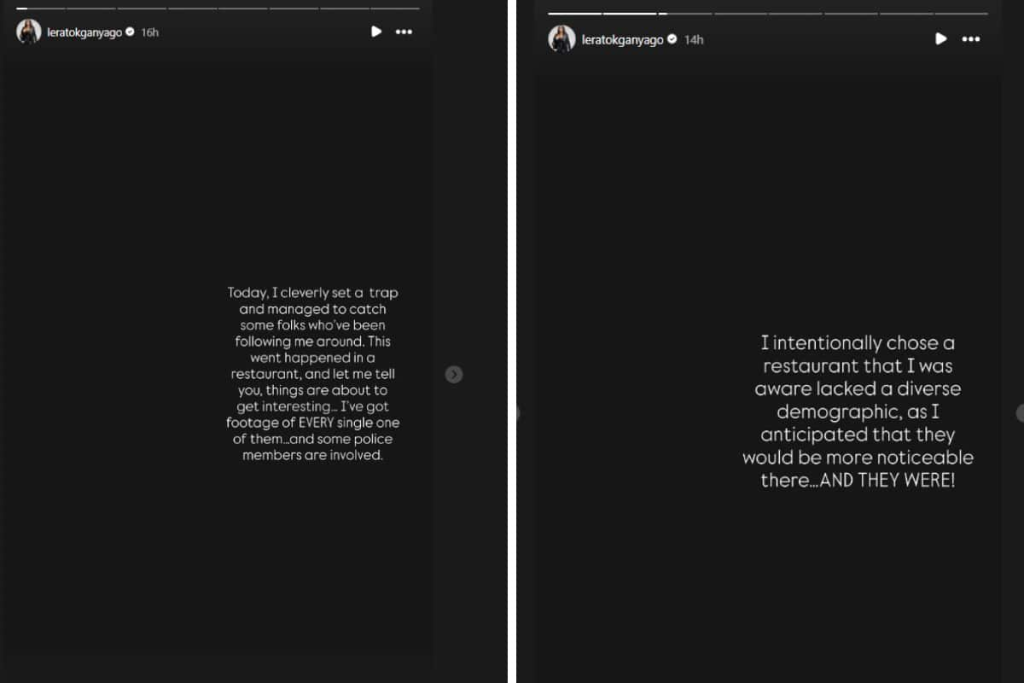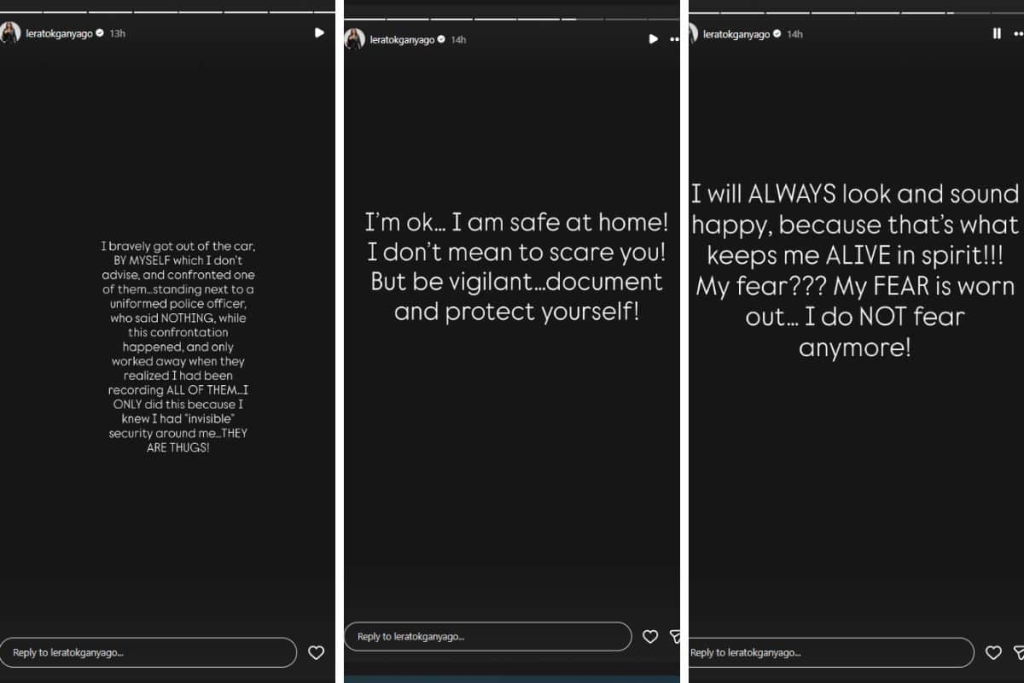Lerato Kganyago Shares That She Was Followed & Sets Trap to Catch Suspects

Table of contents
- Lerato Kganyago Speaks Out After Being Followed: Confidence in Safety and Police Support
- Incident Overview: Allegations of Being Followed
- Kganyago’s Open and Proactive Response
- Importance of Police Involvement and Confidence in Justice
- Public and Community Support for Lerato Kganyago
- Contextualising Personal Safety Issues in South Africa
- Practical Advice for Those Experiencing Similar Threats
- Technology as a Tool for Enhanced Security
- Instagram Story Updates
- Lerato Kganyago’s Positive and Empowered Outlook
- The Role of Public Awareness and Community Engagement
- Collective Responsibility for Safer Environments
Lerato Kganyago Speaks Out After Being Followed: Confidence in Safety and Police Support
Lerato Kganyago, a prominent South African media personality and actress, recently shared her experience of being followed by unknown individuals. Despite the unsettling nature of the incident, Kganyago emphasises she no longer lives in fear and is confident in her personal safety. This article provides an informative and engaging account of the incident, her response, and the wider challenges related to personal safety in South Africa. It also highlights practical advice and the role of community awareness in addressing threats such as stalking and intimidation.

Curious how she’s turned humble beginnings into a headline legacy? Makhadzi Celebrates Her Journey from Limpopo to Stardom Ahead of Her One Woman Show. Tap to dive into her story, journey, and what lies ahead for her solo extravaganza!
Incident Overview: Allegations of Being Followed
In mid-2025, Kganyago disclosed that she was being followed by unknown persons near her residence and in other locations across Gauteng. The identity and motives of these individuals remain unclear. Such behaviour is a form of stalking and intimidation, which closely impacts victims’ lives by causing fear and anxiety.
Kganyago described the experience as disturbing but revealed her determination not to allow it to control her daily life. Instead, she has become vocal about the situation, aiming to break the silence around personal security risks faced by many South Africans.
Kganyago’s Open and Proactive Response
Rather than keeping the experience private, Lerato Kganyago chose to speak out publicly on social media and through interviews. She hopes that by sharing her story, she will inspire others who feel vulnerable to report similar harassment.
Instead of attempting vigilante measures or solitary actions, Kganyago placed her trust in official channels, reporting the incidents to the South African Police Service (SAPS). Her approach reflects a pragmatic, safety-centred response to threats, encouraging cooperation with law enforcement rather than taking undue personal risks.
Importance of Police Involvement and Confidence in Justice
Following Kganyago’s reports, SAPS have been engaged in investigating the claims of stalking. While specifics remain confidential for security and legal reasons, Kganyago has expressed faith in the police’s commitment to ensuring her safety and pursuing justice.
The involvement of law enforcement in such cases is vital. It ensures that incidents are documented, suspects can be identified and apprehended where appropriate, and victims receive protection and support. Kganyago’s willingness to cooperate highlights the importance of victim participation in the justice system to combat harassment and intimidation effectively.
Public and Community Support for Lerato Kganyago
Kganyago’s courage in speaking up has been met with widespread public support. Many South Africans have lauded her for addressing the issue openly, viewing it as a step toward reducing stigma around victimisation and empowering others to seek help.
Social media conversations and news forums reflect a growing awareness of personal safety challenges. Public figures sharing their experiences help to normalise these discussions and promote solidarity among affected individuals.
Contextualising Personal Safety Issues in South Africa
South Africa continues to face high levels of crime, including personal and violent offences. Stalking, harassment, and intimidation are serious concerns, affecting citizens across socio-economic and geographic lines.
South African women, public figures, and vulnerable communities often face heightened risks due to exposure and visibility. These realities require comprehensive strategies encompassing law enforcement, community vigilance, and individual preventive measures.
Practical Advice for Those Experiencing Similar Threats
Security experts recommend certain steps for individuals who suspect they may be followed or harassed:
- Maintain awareness of surroundings and avoid predictable routes or routines.
- Document incidents carefully, utilising a phone or camera where safely possible.
- Report suspicious activities promptly to local police authorities.
- Inform trusted friends or family members about concerns for added support.
- Consider professional security advice or services if the threat is sustained.
- Avoid confrontation with potential suspects alone to reduce personal risk.
Kwanyago’s example shows that following official procedures and prioritising personal safety are critical.
Technology as a Tool for Enhanced Security
Modern technology can bolster personal safety in various ways. Smartphones offer emergency alert systems, GPS tracking, and the ability to record interactions discreetly. Home security devices and surveillance cameras work to deter criminals and provide evidence if incidents occur.
Leveraging such tools empowers individuals to monitor threats effectively and facilitates timely police intervention. Kganyago’s emphasis on vigilance underscores the value of technology alongside traditional safety practices.
Instagram Story Updates


Lerato Kganyago’s Positive and Empowered Outlook
Though initially shaken by the experience, Kganyago champions a message of empowerment. She has publicly declared that she does not live in fear, framing her experience as a call to action for others.
This positive attitude counters the debilitating effects that stalking and intimidation can cause and promotes resilience. Her stance encourages victims to reclaim control over their lives and pursue justice through proper channels.
The Role of Public Awareness and Community Engagement
Kganyago’s public sharing helps to foster broader awareness about threats to personal safety. Community education around stalking and harassment is critical to prevention and early intervention.
By discussing these matters openly, society can build stronger support networks and encourage early reporting. Police and advocacy organisations benefit from such cooperation, enabling more effective responses to complex safety issues.
Collective Responsibility for Safer Environments
Improving personal safety in South Africa requires coordinated efforts across multiple sectors. Law enforcement must maintain public trust and transparency in investigations. Communities and individuals must remain vigilant and supportive. Public figures like Lerato Kganyago play a valuable role by elevating discourse and encouraging proactive safety practices.
The case serves as a reminder that no one is immune to security risks, but through unity, information sharing, and empowered actions, safer environments are achievable.



